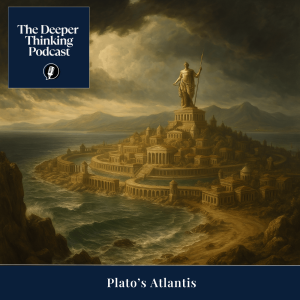
Friday Mar 21, 2025
Plato’s Atlantis - The Deeper Thinking Podcast
Atlantis never existed, and yet it has endured longer than most cities ever do.
Editor’s Note: The following analysis takes a closer look at the episode’s central themes, offering independent insight that adds context and depth to the discussion.
It arrives already submerged — not beneath the sea, but beneath suspicion. A city that gleams too brightly, one whose symmetry is too precise, its metals too rare, its armies too vast, its downfall too narratively clean. In Critias, the story cuts off mid-sentence, the empire dissolving even in language. There is no aftermath, only water. But if Atlantis was merely a fiction, then why does its outline still flicker behind so many ruins, why do its walls still rise in dreams and dig sites alike?
The mind repeats the shape of a lost world. Every civilization carries its Atlantis — not always drowned, but fallen. The image shifts: sometimes volcanic, sometimes punished by gods, sometimes technologically arrogant, other times morally unworthy. What remains consistent is the tension between ideal and excess. The Atlanteans were noble until they weren’t. Their virtue, like a myth’s hinge, turns back on itself. In Plato’s geometry, the island was concentric rings of land and sea — a perfect pattern, impossible to survive. Order, perfected, becomes tyranny. Beauty, enclosed, becomes its own undoing.
There is a word in Greek, hubris, that doesn’t quite translate. It is not merely arrogance, but the sacrilegious kind — a defiance of cosmic limits. Atlantis is shaped by it. So is every empire that overreaches. But what if Atlantis was not a warning, but a mirror? Athens, too, was staging naval power, expanding its influence, claiming moral clarity in war. In Timaeus, the Athenians emerge as the humble victors, virtuous in restraint. But restraint is a story told after the fact. One can read Atlantis not as a failure of others, but a failure in advance — the seed of collapse buried in the impulse to build too well, too much, too far.
The ocean does not remember. But humans do. Or perhaps more accurately, they misremember — projecting into saltwater the shapes they’ve lost on land. There is a kind of cultural echo that repeats the Atlantis pattern: golden age, expansion, decadence, fall. It appears in Augustine’s sack of Rome, in Shelley’s Ozymandias, in the ash of Pompeii, in the steel skeletons of modern capitals. And yet, Atlantis remains curiously clean. No bones, no relics, no real coordinates. It’s the absence that seduces — the erasure more complete than history allows. That’s why its name keeps resurfacing, detached from Plato, from Greece, from its original scaffolding of dialogues and divinity. It becomes a floating cipher, ready to be filled with whatever the present fears most.
Then, just silence. No ruin, no flood. Only the shape of the idea returning.
One imagines walking the outermost ring of the vanished city, feet brushing stone that isn’t there, hearing gulls call across a sky that never hosted such a place. The imagination insists, even when the logic falters. A single sentence breaks through the rhythm — entirely too long, entirely too weighty — but it lands like prophecy: civilization is always most fragile at the moment it believes itself most eternal, and Atlantis, like a parable underwater, is what lingers after that belief has drowned.
Atlantis never existed. Atlantis exists everywhere.
Your support keeps us independent, beholden to no outside influence and accessible to everyone – whether they can afford to pay for news, or not.
If you’re in a position to do so, please consider supporting our work today. It has never mattered more. Thank you.
No comments yet. Be the first to say something!